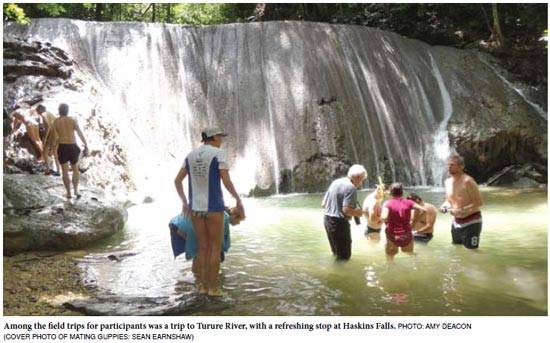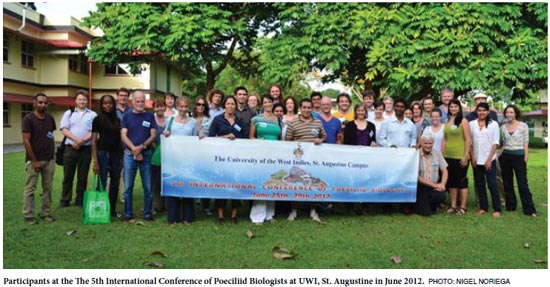
Because it is largely ignored in its native Trinidad and Tobago as a lowly ‘drain fish,’ many are surprised to discover that the common guppy forms the basis of entire careers for many international biologists.
Guppies and their close relatives—mollies, platies and swordtails—are members of the family “Poeciliidae” and share the unusual ability among fish to give birth to live young , instead of laying eggs.
 Poeciliids have earned notoriety for their insatiable sex drive and intriguing reproductive practices, as well as their ability to invade new environments. As a result, several species, including the guppy, are now found on every continent apart from Antarctica, having been released as unwanted pets or in efforts to eradicate mosquito larvae. Poeciliids have earned notoriety for their insatiable sex drive and intriguing reproductive practices, as well as their ability to invade new environments. As a result, several species, including the guppy, are now found on every continent apart from Antarctica, having been released as unwanted pets or in efforts to eradicate mosquito larvae.
The 5th International Conference of Poeciliid Biologists took place at The UWI in June 2012 and was chaired by Professor Indar Ramnarine of the Department of Life Sciences. The conference united academics from throughout the globe, including Australia, the USA, Canada, Mexico and many European countries such as England, Scotland, Norway, Germany, Italy, Portugal and Spain. As the home of the guppy, Trinidad provided an ideal venue for the first of these biennial conferences to be held outside of Europe.
Although many will find it incredible that a conference on something as specific as poeciliids exists at all, the truth is that these fish are used widely as model species. This means they are used to test theories in a wide range of biological disciplines, including genetics, evolutionary biology, invasion ecology, cancer research and animal behaviour.
The colourful males, impressive anti-predator behaviours and dramatic differences between populations mean that these fish are perfect for studying evolutionary biology; in fact some of the best evidence we have of evolution in action comes from studies of Trinidadian guppies.
Invited keynote speakers included three of the world’s most renowned poeciliid biologists. Professor Anne Magurran of the University of St Andrews opened the first session with a fascinating historical overview of guppy science in Trinidad, beginning with its supposed ‘discovery’ by Robert John Lechmere Guppy in 1866 and the subsequent use of the Northern Range as a natural laboratory which continues into the present day.
Professor David Reznick of the University of California, Riverside, theorised about the origin of the poeciliid ability to give birth to live young, offering a fascinating evolutionary genetics perspective.
 On the final day, the audience was wowed by Professor Jens Krause of Humboldt University in Berlin, and his use of guppies and robotic fish to explain swarm behaviour and intelligence in a whole range of species—including humans, and its application to management strategies. On the final day, the audience was wowed by Professor Jens Krause of Humboldt University in Berlin, and his use of guppies and robotic fish to explain swarm behaviour and intelligence in a whole range of species—including humans, and its application to management strategies.
The conference concluded with a series of exciting fieldtrips designed to give delegates a true taste of Trinidad—including turtle watching at Matura, a trip to Asa Wright and a swim at Maracas followed by bake and shark (although being ecologically responsible fish biologists, bake and kingfish was the preferred dish!). Finally, delegates enjoyed a spectacular hike up the Turure River, which ended at a series of beautiful waterfalls... It was a real treat to snorkel with wild guppies in the pools, watching the famous courtship behaviours that many of the visiting academics had only ever seen in laboratory fish tanks.
Delegates were certainly impressed: Professor Craig Sargent of the University of Kentucky thought the conference was “…simply incredible in every respect, from the overall organization, the talks, the food, the field trips, the artwork, the hospitality.” The organisers sincerely hope that this was the representative view of other delegates and are confident that the taste of Trinidad they provided will encourage many future international collaborations in the field of poeciliid research—an exciting and productive area of scientific pursuit that Trinidad is uniquely positioned to support.
Dr Amy Deacon, deputy chair of the conference, is part of the Fish Behaviour and Biodiversity Research Group at the Scottish Oceans Institute, University of St Andrews, St Andrews, Fife, UK. She is currently based at the Department of Life Sciences, UWI, St. Augustine. |





